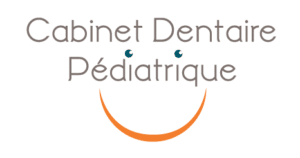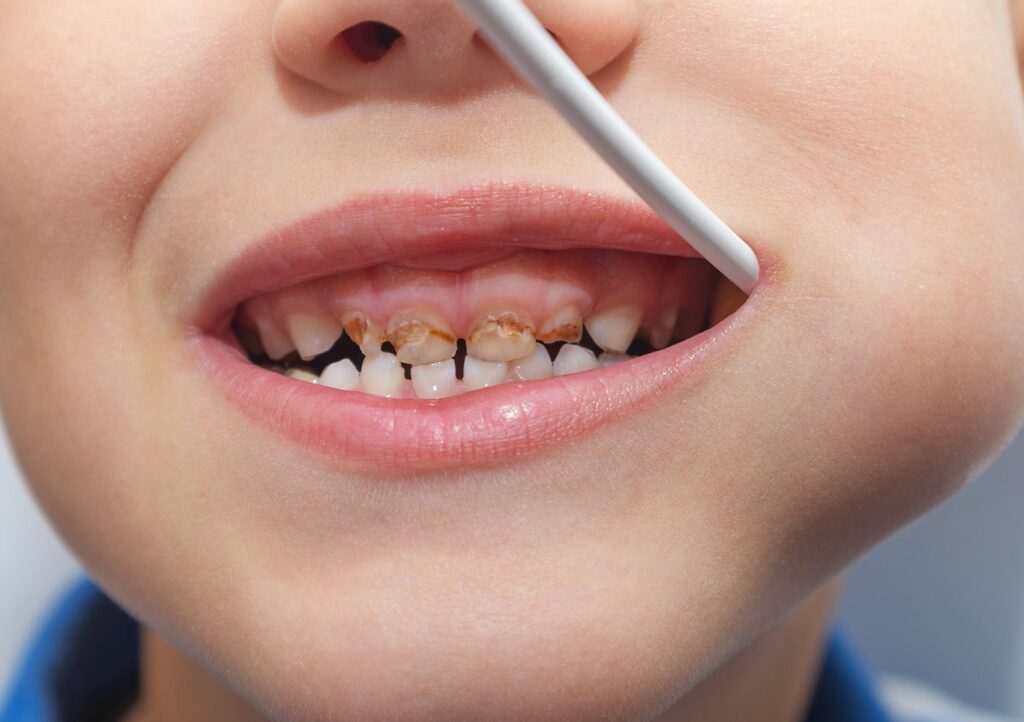A cavity is a lesion in the tooth caused by acids in the mouth that attack the tooth enamel and create a cavity. It is not uncommon for milk teeth are affected by caries.
Find out what causes tooth decay in babies to better understand how it can be treated and prevented.
The causes of cavities in babies
There are different causes of cavities in babies.
Young children can suffer from baby bottle syndrome, also known as baby bottle tooth decay. If children suck on a bottle filled with a sugary drink all day or night, it can lead to early tooth decay.
Indeed, teeth remain in prolonged contact with sugar which feeds the bacteria responsible for cavities.
The appearance of cavities can also be due to a solid diet that is too rich in sugar.
Poor oral hygiene habits can also be the cause of caries.
Finally, parents can transmit caries bacteria to their children through their saliva, for example when they exchange cutlery.
Treatment of tooth decay in a baby
As soon as small yellow stains appear on the teeth of babies, it is advisable to consult a pedodontist. He or she may recommend the treatment for caries the best adapted and thus limit its development.
To treat a cavity in a baby, the dentist may have to use fluoride. This will protect the enamel of the teeth and thus limit the progression of the cavity.
It is also important to establish new habits: thanks to a limited intake of sugary drinks and foods, and daily brushing with a suitable toothpaste, cavities will be avoided on baby teeth.
If the cavities are too large, a complete extraction under anesthesia can be considered.
3 tips to prevent cavities in babies
Limit sugar
Sugar is one of the main causes of cavities in babies. Drinking sweetened beverages throughout the day or night can lead to baby bottle syndrome and lead to cavities.
A diet too rich in sugar is also harmful to babies' teeth. Sweet foods will weaken the enamel of baby teeth and thus increase the risk of caries lesions.
To prevent cavities in babies, it is therefore important to limit sugary foods and to get children used to drinking water.
Adopt good oral hygiene
As soon as the first tooth appears, you can clean your baby's teeth after each feeding.
To gently introduce your baby to teeth cleaning, you can use a water-soaked compress to remove sugar from your child's teeth and gums.
Next, you can use an age-appropriate soft-bristled toothbrush to get your baby into the habit of good dental hygiene.
Finally, don't hesitate to see a child's dentist once a year to check your child's teeth.
Use fluoride
Fluoride is an agent that protects and strengthens tooth enamel. Indeed, it is mainly the enamel that protects the teeth from cavities and it is very thin on the milk teeth.
Toothpaste with fluoride or additional fluoride can limit the risk of cavities or slow down their development.
The consequences of tooth decay in babies
Pain
The development of cavities in babies causes pain when feeding. As the cavity develops, the child cannot tolerate hot or cold food.
These pains prevent the child from eating properly, and therefore from having good nutritional intake that will allow him to develop properly.
Infection
An untreated cavity can quickly spread to other teeth. First present on the surface, it then digs a cavity in the baby tooth.
If left untreated, it can become infected and develop into an abscess.
Development of permanent teeth
The appearance of early cavities on baby teeth can have consequences on permanent teeth. If left untreated, cavities can eventually infect future teeth.
In addition, complete removal of decayed baby teeth can lead to abnormal development of the jawbone and therefore to poor positioning of the permanent teeth.
Dr. Agachi's office is specialized in pediatric dentistry in Paris. Do not hesitate to make an appointment to take care of your child's teeth.




